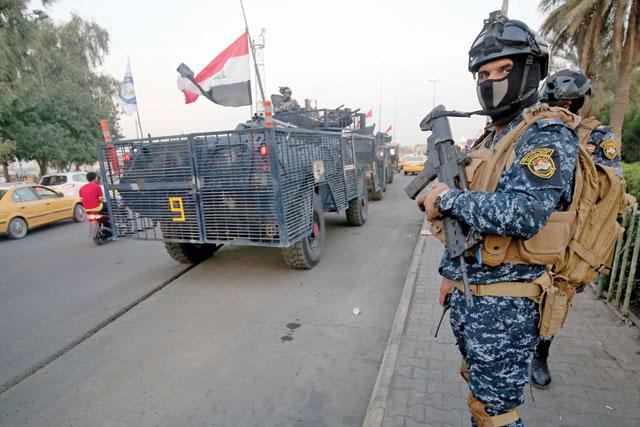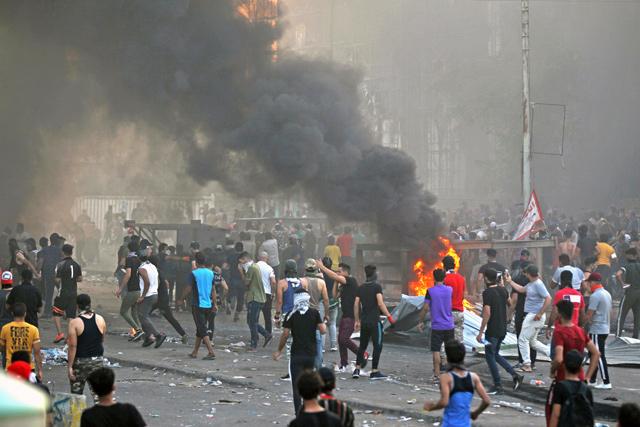You are here
Calm returns to Iraq, as US condemns violence
By AFP - Oct 10,2019 - Last updated at Oct 10,2019

An Iraqi policeman mans a checkpoint in the capital Baghdad's predominantly Shiite Sadr City on Tuesday (AFP photo)
BAGHDAD, Iraq — Calm prevailed in Iraq on Wednesday after a week of anti-government protests left more than 100 dead, prompting the United States to call on the country's government to exercise "maximum restraint".
In Baghdad — the second most populous Arab capital — normal life has gradually resumed since Tuesday.
Traffic has again clogged the main roads of the sprawling city of nine million inhabitants. Students have returned to schools, whose reopening was disrupted by the violence.
On Tuesday, security restrictions were lifted around Baghdad's Green Zone, where government offices and embassies are based.
Iraq descended into violence last week as protests that began with demands for an end to rampant corruption and chronic unemployment escalated with calls for a complete overhaul of the political system.
The demonstrations were unprecedented because of their apparent spontaneity and independence in a deeply politicised society.
Protesters were met with tear gas and live fire. On Sunday night scenes of chaos engulfed Sadr City, the Baghdad stronghold of influential Shiite leader Moqtada Al Sadr, who called for the government to resign.
At least 13 demonstrators died in Sadr City, where the military recognised "excessive force outside the rules of engagement" had been used.
'Tragic loss of life'
According to official figures, the week of violence in Baghdad and across southern Iraq killed more than 100 people, mostly protesters, with more than 6,000 others wounded.
Uncertainty over the identity of the perpetrators persists, with authorities blaming "unidentified snipers".
US Secretary of State Mike Pompeo condemned the violence on Tuesday.
During a call with Iraqi Prime Minister Adel Abdel Mahdi, Pompeo said: "Those who violated human rights should be held accountable", the State Department said in a statement.
“The secretary lamented the tragic loss of life over the past few days and urged the Iraqi government to exercise maximum restraint.
“Pompeo reiterated that peaceful public demonstrations are a fundamental element of all democracies, and emphasised that there is no place for violence in demonstrations, either by security forces or protesters.”
UK Foreign Secretary Dominic Raab also called Abdel Mahdi to express worry over the violence.
“I raised concerns about the response to recent protests — the need to respect peaceful protest & media freedoms,” he wrote on Twitter on Wednesday.
Internet shutdown
While calm has returned to the country, uninterrupted internet access has not.
Cybersecurity NGO NetBlocks blamed the state for imposing “a near-total telecommunication shutdown in most regions, severely limiting press coverage and transparency around the ongoing crisis”.
For a week Internet access has been progressively limited. First access to certain social media sites disappeared, followed by internet connections for telephones, computers and even virtual private network (VPN) applications.
Since Tuesday, connection has intermittently returned to Baghdad and the south of the country.
During these short reconnections, social media sites were accessible via a VPN connection, and images of protesters killed during marches began to be shared.
On Wednesday, the connection remained unreliable. Providers told customers they were unable to provide a timetable for a return to uninterrupted service, information on restrictions, or any other details.
Iraqi authorities have not commented on the restrictions, which according to NetBlocks affected three quarters of the country. In the north, the autonomous Kurdish region is unaffected.
The tentative calm returning to Baghdad comes ahead of Arbaeen, the massive pilgrimage this month that sees millions of Shiite Muslims walk to the holy city of Karbala, south of Baghdad.
Nearly two million came last year from neighbouring Iran, which has urged citizens to delay their travel into Iraq in light of the protest violence.
Its Supreme Leader Ayatollah Ali Khamenei said on Monday “enemies” were trying to drive a wedge between Tehran and Baghdad, in an apparent allusion to the protests.
The demonstrations and accompanying violence have created a political crisis in a country torn between its two main allies — Iran and the United States.
With political rivals accusing each other of allegiance to foreign powers, President Barham Saleh called Monday for “sons of the same country” to put an end to the “discord”.
He called for a “national, all-encompassing and frank dialogue... without foreign interference.”
Related Articles
BAGHDAD — Iraq's parliament held its first session Tuesday after a week of anti-government protests that left dozens dead and sparked a poli
BAGHDAD — Thousands of protesters clashed with riot police in Iraq's capital and across the south on Thursday, the third day of mass rallies
Geneva — The United Nations voiced alarm Tuesday at reports dozens may have been killed in Iranian demonstrations, as the Islamic republic s


















